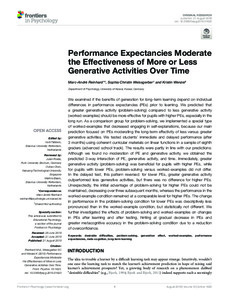Aufsatz

Performance Expectancies Moderate the Effectiveness of More or Less Generative Activities Over Time
Zusammenfassung
We examined if the benefits of generation for long-term learning depend on individual differences in performance expectancies (PEs) prior to learning. We predicted that a greater generative activity (problem-solving) compared to less generative activity (worked-examples) should be more effective for pupils with higher PEs, especially in the long run. As a comparison group for problem-solving, we implemented a special type of worked-examples that decreased engaging in self-explanations, because our main prediction focused on PEs moderating the long-term effectivity of less versus greater generative activities. We tested students’ immediate and delayed performance (after 3 months) using coherent curricular materials on linear functions in a sample of eighth graders (advanced school track). The results were partly in line with our predictions: Although we found no moderation of PE and generative activity, we obtained the predicted 3-way interaction of PE, generative activity, and time. Immediately, greater generative activity (problem-solving) was beneficial for pupils with higher PEs, while for pupils with lower PEs, problem-solving versus worked-examples did not differ. In the delayed test, this pattern reversed: for lower PEs, greater generative activity outperformed less generative activities, but there was no difference for higher PEs. Unexpectedly, the initial advantage of problem-solving for higher PEs could not be maintained, decreasing over three subsequent months, whereas the performance in the worked-example condition remained at a comparable level for higher PEs. The change in performance in the problem-solving condition for lower PEs was descriptively less pronounced than in the worked-example condition, but statistically not different. We further investigated the effects of problem-solving and worked-examples on changes in PEs after learning and after testing, hinting at gradual decrease in PEs and greater metacognitive accuracy in the problem-solving condition due to a reduction of overconfidence.
Zitierform
In: Frontiers in psychology Vol. 10 (2019-08-21) , S. 1623 ; ISSN: 1664-1078Förderhinweis
Gefördert durch den Publikationsfonds der Universität KasselZitieren
@article{doi:10.17170/kobra-20190903643,
author={Reinhard, Marc-André and Weißgerber, Sophia Christin and Wenzel, Kristin},
title={Performance Expectancies Moderate the Effectiveness of More or Less Generative Activities Over Time},
journal={Frontiers in psychology},
year={2019}
}
0500 Oax 0501 Text $btxt$2rdacontent 0502 Computermedien $bc$2rdacarrier 1100 2019$n2019 1500 1/eng 2050 ##0##http://hdl.handle.net/123456789/11292 3000 Reinhard, Marc-André 3010 Weißgerber, Sophia Christin 3010 Wenzel, Kristin 4000 Performance Expectancies Moderate the Effectiveness of More or Less Generative Activities Over Time / Reinhard, Marc-André 4030 4060 Online-Ressource 4085 ##0##=u http://nbn-resolving.de/http://hdl.handle.net/123456789/11292=x R 4204 \$dAufsatz 4170 7136 ##0##http://hdl.handle.net/123456789/11292
<resource xsi:schemaLocation="http://datacite.org/schema/kernel-2.2 http://schema.datacite.org/meta/kernel-2.2/metadata.xsd"> 2019-09-04T06:33:25Z 2019-09-04T06:33:25Z 2019-08-21 doi:10.17170/kobra-20190903643 http://hdl.handle.net/123456789/11292 Gefördert durch den Publikationsfonds der Universität Kassel eng Urheberrechtlich geschützt https://rightsstatements.org/page/InC/1.0/ desirable difficulties problem-solving generation effect worked-examples performance expectancies meta-cognition long-term learning 150 Performance Expectancies Moderate the Effectiveness of More or Less Generative Activities Over Time Aufsatz We examined if the benefits of generation for long-term learning depend on individual differences in performance expectancies (PEs) prior to learning. We predicted that a greater generative activity (problem-solving) compared to less generative activity (worked-examples) should be more effective for pupils with higher PEs, especially in the long run. As a comparison group for problem-solving, we implemented a special type of worked-examples that decreased engaging in self-explanations, because our main prediction focused on PEs moderating the long-term effectivity of less versus greater generative activities. We tested students’ immediate and delayed performance (after 3 months) using coherent curricular materials on linear functions in a sample of eighth graders (advanced school track). The results were partly in line with our predictions: Although we found no moderation of PE and generative activity, we obtained the predicted 3-way interaction of PE, generative activity, and time. Immediately, greater generative activity (problem-solving) was beneficial for pupils with higher PEs, while for pupils with lower PEs, problem-solving versus worked-examples did not differ. In the delayed test, this pattern reversed: for lower PEs, greater generative activity outperformed less generative activities, but there was no difference for higher PEs. Unexpectedly, the initial advantage of problem-solving for higher PEs could not be maintained, decreasing over three subsequent months, whereas the performance in the worked-example condition remained at a comparable level for higher PEs. The change in performance in the problem-solving condition for lower PEs was descriptively less pronounced than in the worked-example condition, but statistically not different. We further investigated the effects of problem-solving and worked-examples on changes in PEs after learning and after testing, hinting at gradual decrease in PEs and greater metacognitive accuracy in the problem-solving condition due to a reduction of overconfidence. open access Reinhard, Marc-André Weißgerber, Sophia Christin Wenzel, Kristin doi:10.3389/fpsyg.2019.01623 publishedVersion ISSN: 1664-1078 Frontiers in psychology 1623 Vol. 10 </resource>
Die folgenden Lizenzbestimmungen sind mit dieser Ressource verbunden:
Urheberrechtlich geschützt

